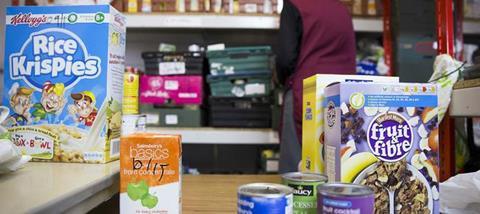
The former justice minister and Conservative Party candidate for Esher & Walton claimed that the Trussell Trust find that their average user is “not someone languishing in poverty but someone with a cash-flow problem.”
For those not familiar with the Trussell Trust, the charity’s mission verse is Matthew 25:35: “I was hungry and you gave me food to eat. I was thirsty and you gave me a drink. I was a stranger and you invited me in.”
That is what each member foodbank of our network does- they feed the hungry, they give the thirsty something to drink and invite them in. Last year alone, the Trussell Trust network of over 420 foodbanks gave out nearly 1.2 million three-day emergency food supplies to people in crisis. The numbers have been steadily increasing since our network was set up in 2005, and hundreds more foodbanks, independent of The Trussell Trust, work in their communities feeding people in crisis.
We are pleased that parliamentary candidates are consulting the data produced by the network of Trussell Trust foodbanks that are run in partnership with local churches and communities. The Trussell Trust numbers provide the most robust, up to date figures on food poverty in the UK and our foodbank figures, which we publish bi-annually, show that the need is rising. We also invite journalists and politicians to spend time in a foodbank to see the stories behind the numbers, and see for themselves how real poverty in the UK is today.
Had Dominic Raab visited a foodbank, he would know that to use the words “cash flow”, conveys completely the wrong impression of the needs of people living in poverty. Foodbanks see people at their lowest – when they haven’t eaten for days or when the heating’s been off for weeks. Some people referred to foodbanks may only be out of pocket for a short time but many do not have savings to fall back on when a benefit payment is delayed or their hours are cut, and so are far more likely to experience a sudden short term crisis. It’s these crises that lead to them being referred for emergency food and support. For everyone coming in to a foodbank- they are a lifeline.
People are referred to Trussell Trust foodbanks by frontline professionals who are best placed to assess need, and the main reasons why they come to us are because of issues with benefits and low incomes. In areas of full Universal Credit rollout, the biggest welfare reform of the last decade, foodbanks have seen nearly three times the national increase in need.
When she came to a foodbank she was given something to eat, a cup of tea, and a chat with someone who really cared.
Foodbanks see vulnerable people, whom Jesus told us to help, going without money, often for weeks or even months. People like Maria, who was unemployed but got a job, who then wasn’t paid for six weeks, during which time her benefits payments were stopped. This situation spiralled into missed bill payments and debt, and eventually severe mental health issues. When she came to a foodbank she was given something to eat, a cup of tea, and a chat with someone who really cared.
Over and over again in the Bible we see how important people are to God- so important that he sent Jesus to die for us. Everyone coming into a foodbank is valued; the aim is that all should catch a glimpse of the way God values humanity.
Everyone coming into a foodbank is valued; the aim is that all should catch a glimpse of the way God values humanity.
We should remember that we are asked by God to "be open-handed [to those] who are poor and needy in your land", Deuteronomy 15.11, and later in Hebrews 13.16 "do not forget to do good and to share with others, for with such sacrifices God is pleased."
The temptation may be to be overwhelmed by the need; it is so great, what can one individual do?
That’s why Trussell Trust food banks are run in partnership with churches and communities. Groups of amazing people have seen the needs of their areas and decided to address them. Forty thousand volunteers across the UK provide food, time and energy to care for the hungry, give the thirsty something to drink and invite people in. The Trussell Trust is extremely grateful to those of all faiths and none for the generous donations of food, toiletries and finance that help foodbanks keep their doors open.
We do this in community and together.
Galatians 6:6 reminds us: "Let us not become weary in doing good, for at the proper time we will reap a harvest if we do not give up."
Click here to request a free copy of Premier Christianity magazine
Alison Inglis-Jones is a trustee of the Trussell Trust. She lives in London and has been involved in the voluntary sector for the last 20 years, previously working for the Shaftesbury Society (now Livability) and London Youth. She has a background in public affairs and public relations and has been on a number of charity boards including the Act Network and the Challenge. She is an active church goer and is delighted to support a number of community projects in South London. She is married with two teenage sons.





























